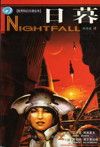ON A PLANET WITH SIX SUNS, NIGHT IS ABOUT TO FALL FOR THE FIRST TIME IN TWO THOUSAND YEARS...
The planet Kalgash is on the brink of chaos—but only a handful of people realize it. Kalgash knows only the perpetual light of day; for more than two millenia, some combination of its six suns has lit up the sky. But twilight is now gathering. Soon the suns will set all at once—and the terrifying splendor of Nightfall will call forth a madness that signals the end of civilization.
Isaac Asimov’s short story “Nightfall” first appeared in 1941. It has since become recognized as a classic, its author a legend. But the short story isn't the wholestory. Now, Dr. Asimov has teamed with multiple Hugo and Nebula Award winner Robert Silverberg to explore and expand one of the most awe-inspiring concepts in the history of science fiction.
In this novel, you will witness Nightfall—and much more.
You will learn what happens at Daybreak.
This is the first of three novels made by expanding shorter works by Asimov. The novelizations were, strictly speaking, done entirely by Robert Silverberg, although he worked with Asimov who supervised and approved what he did. Martin H. Greenberg is the one who came up with the suggestion to do this, and it was not one of his better ideas.
There are two approaches needed to evaluating the result here. The first is as a novel in its own right, and the second is as an expansion of a shorter work.
As a novel, this is not bad, but neither is it earth-shattering. So much for the first approach. The characters and situation are mildly interesting. Unfortunately, the ending is totally implausible and pretty much violates the development of the novel up to that point—the bad guys end up being good guys in their own perverse fashion, and the chief bad guy ends up being a manipulated and on-existent television image—which really weakens the entire work enormously.
(Here, by the way, I take particular exception to what’s going on. Silverberg here, of course, is falling perforce victim somewhat to Asimov’s anti-religious bias in his earlier works and so is not entirelyat fault. Unfortunately, as a member of a religious organization with a well-defined head, I find it totally unbelievable that such an organization could have a bogus head who never makes any kind of personal appearances in the flesh. Sorry, but that really hurt the novel in my eyes.)
The final result is something not as good as Silverberg’s best work—or as good as Asimov’s best.
And ultimately, this is the real problem here. Given the ready availability of “Nightfall” the story, which is much, much better, why bother with the longer and lesser work?
As a novelization, Silverberg has done a good job, on the whole. He’s smoothed out the more obvious pulpishness of Asimov’s early style, cleaned up the plot, and granted depth to the characters. He also gained some of the expansion by adding to the story at the beginning and end, and it is only in the last third, dedicated to the after-the-eclipse stuff, that the plot heads off into left field and sails over the fence.
Skip the novel. Read the story instead.


